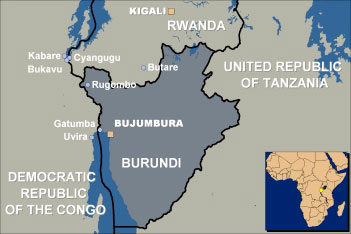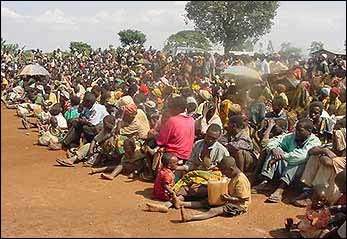Refugee movements increasing in the Great Lakes area
Refugee movements increasing in the Great Lakes area

BUJUMBURA, Burundi, October 17 (UNHCR) - As the number of Congolese refugees fleeing fighting in eastern Democratic Republic of the Congo (DRC) rises to nearly 9,000 in Burundi, small numbers of refugees have arrived in Rwanda's south-western border town of Cyangugu. This comes amid growing fears that more people will be forced from their homes by continuing tensions in the DRC's Kivu region.
By the evening of Tuesday, October 15, the UN refugee agency in Burundi had registered close to 4,000 Congolese refugees at a temporary site in Rugombo commune, north-western Burundi. Another 1,000 are waiting to be screened and registered. Further south, UNHCR was providing relief aid to some 3,600 refugees at a transit facility in the town of Gatumba, close to the Burundi capital of Bujumbura. The group in Gatumba was among the first to arrive in Burundi following the fall of DRC's Uvira town to Mai-Mai rebels on October 12.
A joint team of UN and non-governmental agencies (NGOs), led by UNHCR, visited Rugombo on Tuesday and was told that several refugees had drowned while crossing the River Ruzizi, which joins Lake Kivu and Lake Tanganyika and runs along Burundi's north-western border with the DRC. Burundian authorities spoke of one refugee woman who had lost five of her six children when they were swept away by the waters of the Ruzizi.
The Congolese refugees entered Burundi through several river crossing points. They had to swim across the river, as none of the crossing points had bridges or barges. The aid team that visited two of the crossing points said they saw large herds of livestock being brought across from areas in south Kivu. The refugees, from different Congolese ethnic backgrounds, said they were bringing the livestock across the river border for safekeeping in Burundi. They were mainly farmers or livestock owners.
The UN/NGO team said the refugees at Rugombo were in good health. Many had carried basic personal belongings and some food. UNHCR immediately began distributing basic domestic supplies and water. Food distribution was scheduled to begin on Thursday.
In Gatumba, further south, the refugee agency continued with the registration of new arrivals. Numbers in the temporary settlement there have climbed to 3,687. Among this group are scores of separated children, some of them unaccompanied minors. At least a dozen were acting as heads of families, caring for other siblings. UNHCR is providing special care to these groups of children as it continues identifying of other vulnerable groups.
In Rwanda, close to 100 Congolese arrived in Cyangugu, on the southern shores of Lake Kivu, on Monday. Many said they fled to Rwanda because they feared reprisals against people perceived to be linked to the DRC rebel group, Congolese Rally for Democracy (RCD-Goma). The UN refugee agency and Rwandan authorities are assisting the recent arrivals.
Meanwhile, as Burundi readies itself for a possible larger influx of Congolese refugees through its eastern borders, an increasing number of Burundians are fleeing their own war-torn country for neighbouring Tanzania. Since the beginning of October, more than 11,500 Burundi refugees have sought asylum in Tanzania, bringing the total number of new Burundi refugees into Tanzania to more than 17,400 this year.

The latest Burundian arrivals have been screened by UNHCR legal staff and transferred to Lukole camp in Ngara district, Tanzania. Many of the new arrivals, mainly women and children, say they are from Cankuzo province, eastern Burundi. Due to the long walk through rough terrain without food for several days, the refugees are very weak and tired. The majority of them are without belongings and have only the clothes on their backs.
The UN refugee agency is continuing with its operation to aid the voluntary return of Burundian refugees who wish to return to northern Burundi. The number of refugees opting to return home has, however, steadily declined from a weekly average of over 1,000 to less than 400.








